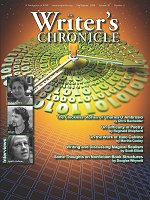May/Summer 2008 
A Bridge Flung Over the Abyss: On the Work of Italo Calvino

Martha Cooley
Folktales also perform a moral function. The mere act of telling and listening to them, claims Calvino, is an inducement to the contemplation of ethical opportunities and options, temptations and transgressions, goods and ills.
Read more...
On Difficulty in Poetry

Reginald Shepherd
It's been the fashion at least since the Modernists to complain that contemporary poetry has become difficult, and that this difficulty has alienated the readers who used to flock to poetry as they now flock to John Grisham novels and American Idol. I am not sure what constitutes the easy poetry these people look back to: Shakespeare? Donne? Milton? I'm also not sure when and where this massive poetry audience existed.
Read more...
An Interview with Nahid Rachlin

Sheila Bender
I write what comes naturally and is important to me, and I give the same advice to my students.
Read more...
Warranted Magic: Writing & Discussing Magical Realism

Scott Elliott
When talking about a work of magical realist fiction in workshop, it might be helpful to ask whether magical elements in the story are warranted. What in the story necessitates the move to magic? Why does the story need the supernatural?
Read more...
At Play in the Fields of Time: The Clockless Stories of Charles D'Ambrosio

Chris Bachelder
Most conventional short fiction has a clock, and this clock starts ticking early in the story. Like the clock at a football or basketball game, the story's clock counts down toward zero. The clock implies the end of the story,
the point beyond which the story will not go, and thus it creates the time-space within which the meaningful events of the story will occur.
Read more...
Some Thoughts on Nonfiction Book Structures

Douglas Whynott
I found it thrilling to reduce a lengthy narrative to a few index cards, to be able to shuffle them around to produce different options-you could even toss them up into the air and see what came of it, like a fortune teller.
Read more...
An Interview with Judith Vollmer

Camille-Yvette Welsch
Rough spatial visions, wanderings, meditations, and rages are what I like to work with and what I aspire to. What people say and dream on entering a new/old or intimate/peculiar place interests me. I think about Dickens who stood in front of a mirror and practiced illiterate voices.
Read more...
Wild Nonfiction: An Interview with David Gessner

James M. Lang
Most readers familiar with David Gessner's work know him for his writings about the natural world. In 2004, he published an essay collection, Sick of Nature. The essay from which the book title comes begins by proclaiming that Gessner is sick of nature and sick of nature writing; by the end of the piece, though, he comes around to clarify that what he's really sick of are the boxes in which publishers and readers put the natural world-if birds or coyotes appear in your book, you're a nature writer.
Read more...
